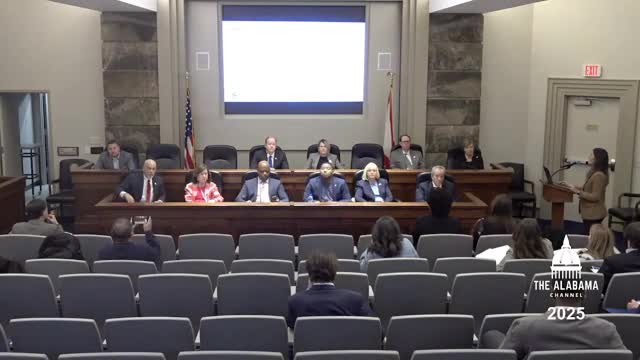Commission debates standardizing recidivism measures amid data-quality gaps
January 14, 2025 | Joint Interim Committees, Alabama Legislative Sessions, Alabama
This article was created by AI summarizing key points discussed. AI makes mistakes, so for full details and context, please refer to the video of the full meeting. Please report any errors so we can fix them. Report an error »

Commissioners and a Council of State Governments Justice Center presenter flagged data-quality and measurement gaps that complicate both evaluation of reentry outcomes and comparisons with other states.
The Justice Center presenter summarized findings from the commission’s assessment: inconsistent definitions of recidivism, limited ability to track outcomes beyond reconviction (such as Medicaid use, unemployment and wages), data-entry and integration problems across agency systems, and the absence of a single identifying field that would link records across systems.
Representative England and other commissioners argued for simpler, standardized metrics for use with lawmakers, citing Bureau of Justice Assistance (BJA) three-year reconviction measures as an example of a common approach. Representative England said aligning measures — even if imperfect — could help legislators compare trend lines across states when making policy decisions. The presenter recommended states look at multiple recidivism measures (arrest, conviction, reconviction) and additional outcome measures such as employment, wages and service engagement to give a fuller picture of reentry success.
Commissioners also identified a practical data problem: pre‑2016 court records and documents exist only as PDFs, and converting those files to searchable, linkable data is expensive and technically challenging. The commission proposed a data-focused working group to define recidivism measures, identify feasible outcomes to track, and outline information-sharing arrangements.
No legislative standard was adopted at the meeting; the commission agreed to address measurement questions in the proposed data working group.
The Justice Center presenter summarized findings from the commission’s assessment: inconsistent definitions of recidivism, limited ability to track outcomes beyond reconviction (such as Medicaid use, unemployment and wages), data-entry and integration problems across agency systems, and the absence of a single identifying field that would link records across systems.
Representative England and other commissioners argued for simpler, standardized metrics for use with lawmakers, citing Bureau of Justice Assistance (BJA) three-year reconviction measures as an example of a common approach. Representative England said aligning measures — even if imperfect — could help legislators compare trend lines across states when making policy decisions. The presenter recommended states look at multiple recidivism measures (arrest, conviction, reconviction) and additional outcome measures such as employment, wages and service engagement to give a fuller picture of reentry success.
Commissioners also identified a practical data problem: pre‑2016 court records and documents exist only as PDFs, and converting those files to searchable, linkable data is expensive and technically challenging. The commission proposed a data-focused working group to define recidivism measures, identify feasible outcomes to track, and outline information-sharing arrangements.
No legislative standard was adopted at the meeting; the commission agreed to address measurement questions in the proposed data working group.
View full meeting
This article is based on a recent meeting—watch the full video and explore the complete transcript for deeper insights into the discussion.
View full meeting
